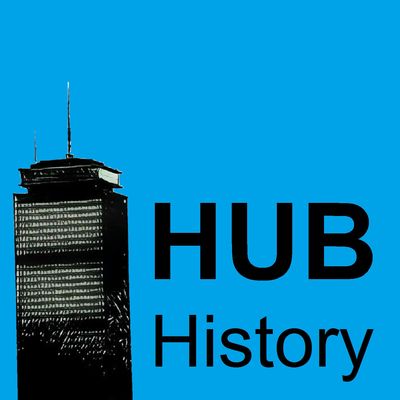Where two history buffs go far beyond the Freedom Trail to share our favorite stories from the history of Boston, the hub of the universe.
http://HUBhistory.com
Remembering the Boston Massacre, with Nat Sheidley (episode 174)
March 5th marks the 250th anniversary of the Boston Massacre, when a party of British soldiers fired into a crowd of civilians, killing five. It was a terrible personal tragedy in a small town of 15,000 residents, and it almost immediately became politicized. Nat Sheidley, the president and CEO of Revolutionary Spaces, is going to remind us what happened on that terrible night, how tightly intertwined the lives of the soldiers and town residents were at the time, and how every generation reinterprets what the tragedy means.
Please check out the transcript and full show notes at: http://HUBhistory.com/174/
And support the show on Patreon.
Remembering the Boston MassacreThis week’s podcast is sponsored by Liberty & Co, who sell unique products inspired by the American Revolution. In honor of the 250th anniversary of the Boston Massacre, they’re introducing a new offering in their Candles of the Revolution series. The Bloody Boston Massacre Candle smells like musket fire, and it’s molded into a skull-shaped glass jar. If candles aren’t your thing, you select a range of Bloody Boston Massacre products, which bear the design of four coffins that was originally created by Paul Revere to remember the victims of the massacre. Or you can opt for a coffee mug bearing the likeness of John Adams and the phrase “facts are stubborn things,” which Adams made famous as part of his defense of the redcoats against murder charges. Save 20% on any purchase with the discount code HUBHISTORY.
Henry Pelham Paul Revere The plate Revere used to create his engraving is at the Commonwealth Museum Revere’s Sketch Map- Check out the press release announcing the creation of Revolutionary Spaces.
- Henry Pelham’s portrayal of the Massacre and Paul Revere’s ripoff.
- Paul Revere’s sketch map of the Massacre site, showing where each body fell, and his design of four coffins.
During this week’s interview, Nat Sheidley pointed out how completely shocking the violence of the Boston Massacre would have been in a small town of 15,000 residents. Not only did everyone in town know one another, but by early 1770, they all knew the occupying British soldiers, as well. After about 18 months of living side by side, the locals and the redcoats were tied together by commercial relationships, friendships, romances, and more. In describing these connections, Nat recommended the book The Boston Massacre: a Family History, by Serena Zabin, which was published just a couple of weeks ago. I haven’t had a chance to pick it up yet, but based on Nat’s recommendation and the buzz I’ve seen on Twitter, it sounds like a fascinating read. Here’s the publisher’s description:
The story of the Boston Massacre—when on a late winter evening in 1770, British soldiers shot five local men to death—is familiar to generations. But from the very beginning, many accounts have obscured a fascinating truth: the Massacre arose from conflicts that were as personal as they were political.
Professor Serena Zabin draws on original sources and lively stories to follow British troops as they are dispatched from Ireland to Boston in 1768 to subdue the increasingly rebellious colonists. And she reveals a forgotten world hidden in plain sight: the many regimental wives and children who accompanied these armies. We see these families jostling with Bostonians for living space, finding common cause in the search for a lost child, trading barbs and and sharing baptisms. Becoming, in other words, neighbors. When soldiers shot unarmed citizens in the street, it was these intensely human, now broken bonds that fueled what quickly became a bitterly fought American Revolution.
Upcoming EventRevolutionary Spaces has an entire year of programming built around the commemoration of the 250th anniversary of the Boston Massacre. Starting this week, there will be living history events, theatrical productions, public art, and more. Gather at Old South Meeting House on Thursday, March 5th to mark the anniversary with modern interpretations of the Massacre orations by prominent Boston personalities. Then on Saturday, there will be a full day of events at Old South Meeting House, the Old State House, and the streets in between, culminating with a recreation of the massacre. A week after the anniversary, return to Old South Meeting House on March 12 to see a costumed actor recreate Joseph Warren’s famous 1775 Boston Massacre oration. And watch the Revolutionary Spaces website for more events as they’re announced throughout the year.
